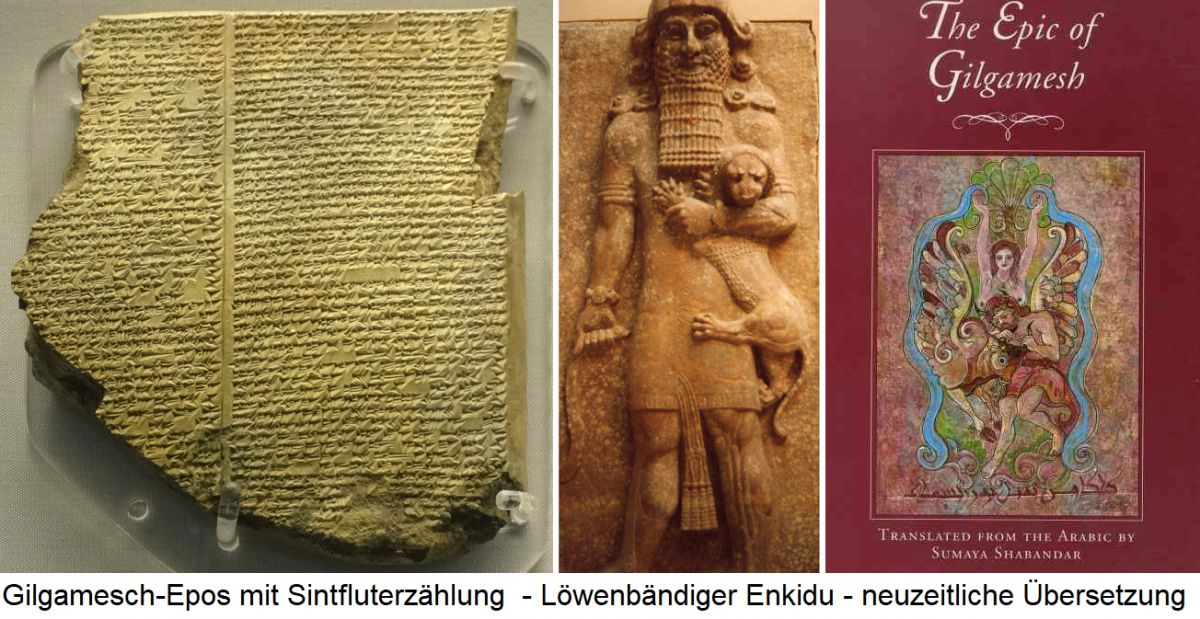Legendary king of Uruk on the banks of the Euphrates, who is said to have lived around 2700 BC. The name roughly means "the ancestor (was) a prince" and is the short form of a longer name. A longer name is documented as Pagbilgameš-Utu-pada in the archaic texts of Ur. He is named as a god in a list of gods and the construction of the wall of Uruk is attributed to him (but also to another ruler). However, it cannot be completely ruled out that this was merely a literary figure. The city of Uruk (mentioned in the Old Testament of the Bible as Erek) was the centre of Sumerian culture in the 3rd millennium BC (today the ruins of Warka in southern Iraq). At that time, the Sumerians ruled a large part of Mesopotamia. They were organised into city states and were the forerunners of the later empires of Assyria and Babylonia. Gilgamesh is the central hero of numerous poems.

Epic of Gilgamesh
In the 12th century BC, the poet Sin-leqe-unnini created the work that is known today as the Epic of Gilgamesh. It is the first written literary work of mankind. Some of its motifs later found their way into the legends, fairy tales and religious works of many peoples, including the Flood with the hero Utnapishtim (the Noah of the Bible). Most of the surviving text comes from the great clay tablet library that the Assyrian king Assurbanipal (668-625 BC) had built in the capital Nineveh.
It is recorded in cuneiform script on twelve clay tablets. Ancient Nineveh was discovered in 1849 and four years later the clay tablets were discovered, which are now in the possession of the British Museum in London. Gilgamesh reigned shortly after the Flood. He is two-thirds god and one-third man and is described as "powerful, handsome, knowledgeable and wise". He ruled over his people as an absolute tyrant. For example, he claimed the "right of the first night" (ius primae noctis), which is often mentioned among potentates.
Primeval man Enkidu
The goddess Aruru creates the prehistoric man Enkidu. By drinking beer, he becomes a cultured human and, after they have initially fought each other, a friend of Gilgamesh. The rest of the epic centres on the mortality of humans and Gilgamesh's attempt to escape it. In his grief for Enkidu, who was killed by the gods, Gilgamesh enters the realm of the sun, where he discovers an enchanted vineyard whose wine could finally grant him immortality. This vineyard is described in flowery language: Rubies are its fruit, hanging in clusters, marvellous to behold; lapis lazuli are its branches, and it bears fruit, desirable to behold. But the guardian of the vineyard, the goddess Siduri Sabitu, refuses to let him enjoy it.
Image left: By Fæ, CC BY-SA 3.0, Link
Image right: By Unbvekannt - TangLung, CC BY-SA 3.0, Link
Source: WIKIPEDIA
Voices of our members

For my many years of work as an editor with a wine and culinary focus, I always like to inform myself about special questions at Wine lexicon. Spontaneous reading and following links often leads to exciting discoveries in the wide world of wine.
Dr. Christa Hanten
Fachjournalistin, Lektorin und Verkosterin, Wien